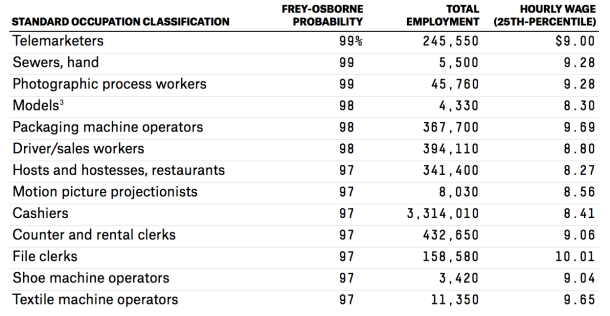We’ve written critically about the proposal to raise the minimum wage here at Difficult Run before. (Quite a lot, in fact.) In one of the first pieces I wrote back in February I pointed out that there are basically three criticisms of the minimum wage hikes.
- By raising the cost of labor, they eliminate jobs.
- The benefits tend to go towards families that aren’t poor.
- There are much better alternatives (like the EITC).
The minimum wage is not the most evil policy in the history of the world, obviously, but I really loathe it because it’s so obviously a bad idea and therefore the only reason it gets advanced is either because politicians are negligent or are intentionally exploiting public ignorance about how bad of a policy it is. If we can’t stop a policy like minimum wage, what hope do we have of rational policy in general?
There’s one more aspect to the debate, however, and that is the fact that as the price of human labor raises, the likelihood of replacing their jobs with robots increases as well. That’s the gist of a new post from Nate Silver’s 538 website: The Shift From Low-Wage Worker to Robot Worker. The article covers recent research by economists trying to see which jobs are most vulnerable to being replaced by robots. The short version? Millions of low-wage jobs are incredibly vulnerable to being replaced by robots.
These probabilities are estimated over a 20-year window, but the trend is clear: millions of American jobs are at risk of automation. In the long run, this is a good thing. In the long run, we don’t want anyone to have to do dull, repetitive, simple work just to put food on the table. In the long run, it would be great if all people worked relatively complex jobs that required minimal physical pain and injury and maximal creativity. The question is how we transition from where we are now. We need a gradual transition accompanied by ample educational opportunities. What we absolutely do not need is an artificial increase in the price of labor. Raising the minimum wage might be good politics, but it’s absolutely terrible policy. In addition to the three problems noted above, it can only serve to make the transition more rather than less gradual.


“We need a gradual transition accompanied by ample educational opportunities. What we absolutely do not need is an artificial increase in the price of labor. Raising the minimum wage might be good politics, but it’s absolutely terrible policy. In addition to the three problems noted above, it can only serve to make the transition more rather than less gradual.”
First, do we necessarily *need* a gradual transition? And what defines “gradual”? If the need arises from our less than agile education/social safety/transfer systems, then we must attack those problems and not use them as an excuse to prolong toiling. The more sudden and systemic the disruption, the stronger the signal is to workers and policy-makers as compared to a long, slow bleed-out of wealth and human capital from the middle class. It’s easy to imagine a 30-year hollow-out leaving far more people behind than, say, a 10-year period of labor market re-ordering that portends the new status quo.
Second, assume there is some kind of “natural” rate of automation as a function of cheap labor- it’s been retarded, and not accelerated by, a flat minimum wage:
http://www.nelp.org/page/-/rtmw/uploads/Real-Value-Minimum-Wage-NELP.jpg
I, for one, welcome our new robot overlords.